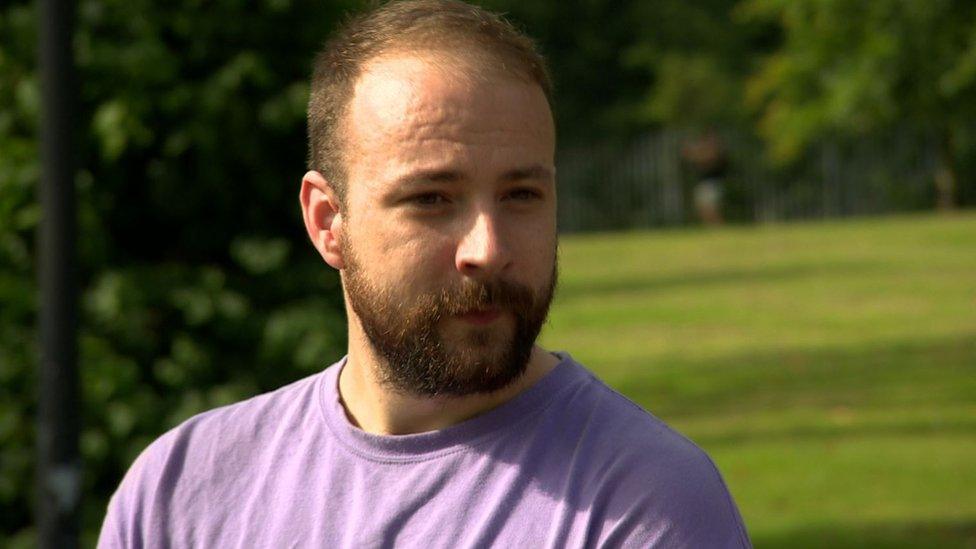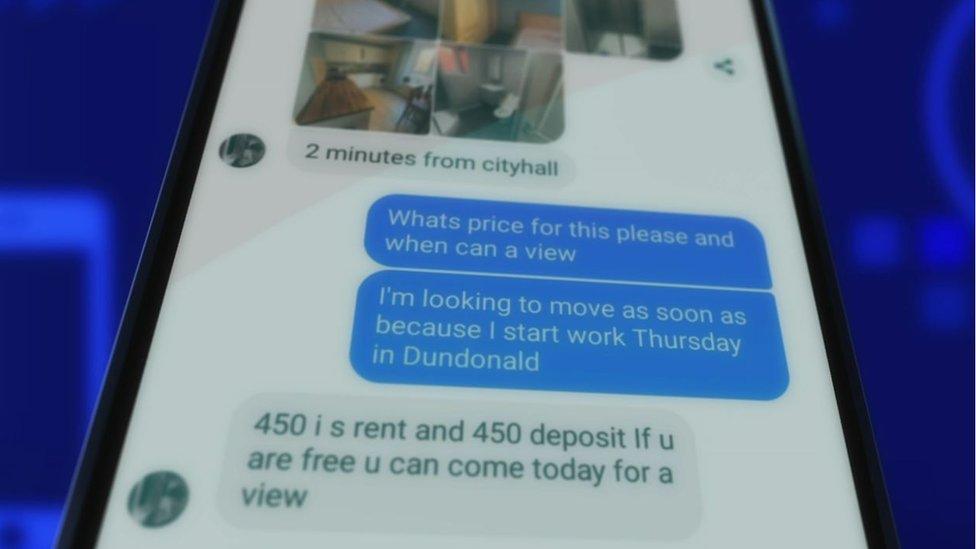Rental scam: I lost hundreds of pounds to a fake landlord
- Published

Craig, 29, has been looking for somewhere to rent for nearly two years
A man who lost £450 to a fake landlord in a rental scam has urged others to be careful looking for properties online.
Craig Barton gave the money to a man he thought was the landlord of an apartment in Belfast city centre.
The PSNI say they have received five reports of people falling victim to that one scam.
Experts say a shortage of private rental accommodation, and rising prices, are creating perfect conditions for fraudsters to thrive.
"You're basically being targeted because you're vulnerable and you're wanting this house so much," said Craig.
The 29-year-old had been looking for somewhere to rent for nearly two years.
He doesn't have a guarantor, which makes the process more difficult. So when he saw a room online in a Belfast city centre apartment, he set up a viewing.
"I met the person, they seemed really nice. He took me in, showed me about the house, showed me how to use all the heating and everything," he said.
"There was someone in the room I was going to live in and he said he was throwing him out for being too loud."
When Craig, a chef, returned, the man had a contract ready to sign.
"That next day when I went in, he had a contract on his phone, it looked real and everything, all written out. It had his signature on it and I put my signature on it.

Craig and the scammer had exchanged text messages before the house viewing
"He gave me the key to the door, just to the apartment. When I left, I said I didn't have a key for the main door of the building, he said you'll get it when the other tenant moves out."
Craig handed over £450 as a deposit. A few days later when he arrived to move in, he tried calling the man he'd been texting.
"There was no reply so I was getting the feeling that something was going wrong. I couldn't get in the main door, so I rang the buzzer.
"It was someone else that answered, they said they didn't know what I was talking about. The number [of the apartment] he gave me was wrong.
"I was gutted after, I felt like I lost all my money and everything."
'It's important to be vigilant'
Amy Lyness of Housing Rights, a group which offers housing advice in the social and private sectors, external, said they are hearing about a lack of available housing across the board.
"They [fraudsters] would understand that people are desperate, that there's a lack of available housing along with the increased prices that people are having to pay," she said.
"They can produce an advertisement that says there's available housing at a slightly reduced rent.
"They're going on the basis that desperate people will want to jump on that good deal and that's where they're likely to get caught without being able to establish the legitimacy of the tenancy."
The Police Service of Northern Ireland (PSNI) said it was investigating Craig's report and four others related to the same scam.
Belfast District Supt Gavin Kirkpatrick is urging people to be vigilant.
"With so many people seeking properties online, scammers will look for opportunities to take advantage and swindle people out of their money," he said.
"So, it's really important to be vigilant and take some time to do your research on the company, or person you are dealing with.
"Confirm the advertiser is genuine, and check the property exists and is available. If it's a scam there's a good chance others will write about their experience and some basic internet research will find it."
Figures from Action Fraud, the national fraud reporting centre, show there were 5,751 reports of rental scams across the UK in 2022, up nearly a quarter on the previous year.
One popular site Gumtree recently issued a warning to its users.
Craig found the apartment listed initially on a Facebook group.
A spokesperson for Meta, Facebook's parent company, said this was an "industry-wide issue".
"Scammers are using increasingly sophisticated methods to defraud people in a range of ways including email, SMS and offline," she said.
They added the company spent $5bn (£4.08bn) last year on safety and security and said they encourage people to report activity like this to Meta and the police.
- Published12 October 2022
